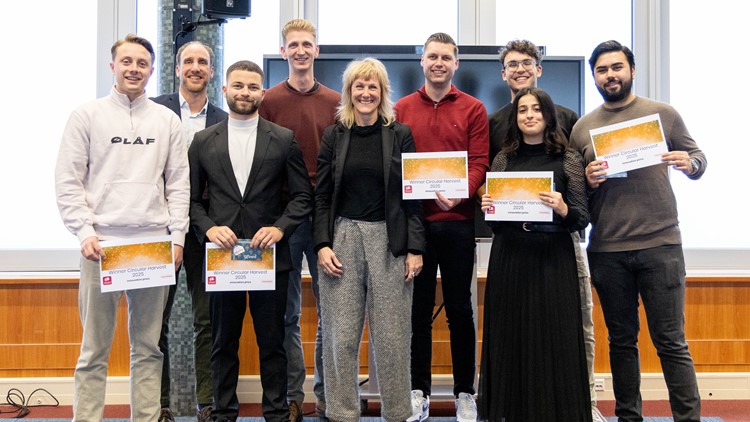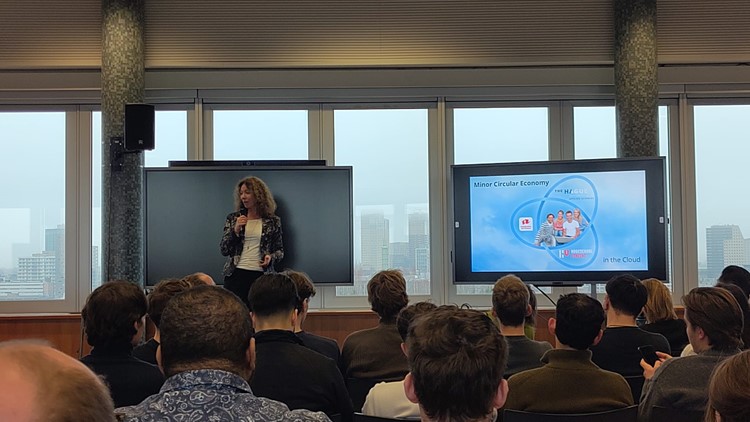Facts and figures
The programme at a glancePart of School
Programme information
What to expectMethod
Method:
- Students work in a group on a real challenge provided by a health care organization. (for example a hospital, home care organization or a nursing home).
- Induvial students work on their personal development and transformation to become a circular minded person and professional
Learning phase 1
In the first 9 weeks, students are offered a wide range of workshops and master classes that allow them to acquire the necessary knowledge and skills. They select a minimum of 8 workshops appropriate to the project and fitting their own interests. The workshops are jointly offered by all the circular minors from the Hogeschool Rotterdam (by three institutes of Build Environment, Engineering and Applied Science and Rotterdam Business School).
Learning phase 2
In this phase, students develop ideas to transform the system, develop prototypes and validate these in practice. They also work on an individual project, continuing to build their skills and knowledge base. This may be a workshop, an e-book or literature review, a podcast or a short documentary or a circular product. All results are shared and disseminated at the closing event Circular Harvest.
Weeks 5 and 14 are spent on reflections, both on the work done for the system transformation and the personal transformation. Students receive feedback on activities, products, processes and progress.
Weeks 9 and 18 are reserved for the assessment of work completed for system and personal transformation.
Type of assessment:
- Group work is assessed by the presentation of the research and the actual outcomes (implementation/impact) + a report containing evidence and reflection
- Individual learning is assessed by means of an oral assessment with two teachers + a portfolio containing evidence and reflection
Learning outcomes
At an individual level, the minor:
- Aims for students to discover their full potential as a human being and as a responsible, global citizen who is aware of the boundaries of our planet.
- Act as change agents for a zero-carbon economy and a safe space for humanity within planetary boundaries.
- Make a visible impact by making small contributions to complex challenges and wicked problems on the local and the global level.
More generally, the student:
- Has demonstrable knowledge and understanding of a discipline that builds on and exceeds the level achieved in secondary education; usually operates at a level where, with the support of specialised manuals, there are some aspects that require knowledge of the latest developments in the field of expertise (knowledge and insight).
- Is able to apply his knowledge and insight in such a way that it shows a professional approach to his work or profession and has competencies for drawing up and deepening arguments and for solving problems in the field of expertise (applying knowledge and insight).
- Is able to collect and interpret relevant data (usually in the field of expertise) with the aim of forming an opinion that is partly based on weighing relevant social, scientific, or ethical aspects (making judgments).
- Is able to communicate information, ideas and solutions to an audience consisting of specialists and non-specialists (communication).
- Has the necessary learning skills to enter a follow-up study or enter a job that presupposes a high level of autonomy (learning skills).
Calendar

Awarding
After completing your exchange programme at Rotterdam University of Applied Sciences, you will receive a:
- Transcript of records
Subjects
An indication of the subjects you can expect
Block 1 and 2
-
System Transformation (15 ECTS)
System Transformation (15 ECTS)
Topics
- Report on your activities for the competencies including references to the evidence in supporting documents
- Weekly progress reports to all stakeholders involved
- All sorts of maps, overviews, and frameworks produced in the process
- Implementation of the student research protocol on the research drive of the research centre
- Project proposal and action plan
- Presentations for various audiences (PPT, posters ect)
- Outcomes: research report, tool/instrument/prototype
- Transfer document, which forms the starting point for the next group of students
Learning materials
Workshops
Type of assessment
Group work is assessed by the presentation of the research and the actual outcomes (implementation/impact) + a report containing evidence and reflection
Learning outcomes
You work on developing the following competencies:
- Doing Trustworkhy Research
- Working in complex environments
- Designing circular futures
-
Personal Transformation (15 ECTS)
Personal Transformation (15 ECTS)
Topics
- Starting document: a personal development plan, including a reflection on where you stand now in your leadership skills (based on the outcomes of one or two leadership tests and an overview of what you would like to develop and how during this semester.
- Report on your activities for competency leading self and others, including references to the evidence in supporting documents
- General reflection report on the learning moments, process, and development of goals and an assessment of the competency level achieved
- Learning log, adding up to 420 hours spent on activities and which contains evidence of your personal transformation.
Type of assessment
Individual learning is assessed by means of an oral assessment with two teachers + a portfolio containing evidence and reflection
Learning outcomes
You work on developing the following competency:
- Leading self and others
Practical information
What you need to knowLocation Kralingse Zoom
Where you can find us



